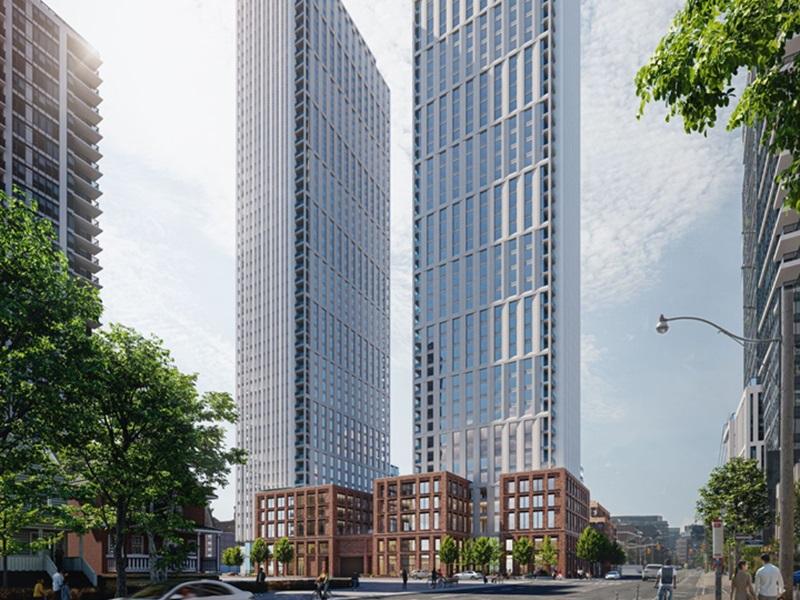
Over the past 30 years, there have been only two or three tenant-friendly periods in the Vancouver office market, but we’re in one now according to Bart Corbett, a tenant leasing specialist with Cushman & Wakefield.
“This is going to be a tenant’s market for a few years,” Corbett, the firm’s executive vice-president, office, told attendees at the Vancouver Real Estate Forum on April 5.
Overall downtown office vacancy climbed from 2.6 per cent in 2019 to 10.8 per cent currently, according to numbers provided by brokerage house Avison Young during an office panel at the forum.
Additional stats from the firm’s Q1 2023 Metro Vancouver office market report show sublease space has climbed to 25.6 per cent as a percentage of total available space. Available office space in the market now totals 5.3 million square feet and there is an additional 6.54 million square feet under construction across 45 projects in the region that will come on-stream mostly in and around 2027.
Vancouver saw 590,000 square feet of absorption in the first quarter. Increased vacancy is being driven by several factors, including:
- the ongoing work-from-home revolution;
- a widening hole left by the struggling tech industry; and
- belt tightening among various businesses due to inflation, elevated borrowing costs and the expensive pursuit of workers.
Experts from inside and outside the market, however, tend to believe Vancouver’s vacancy could start to ease beyond the end of this year, with many putting their faith in a larger return-to-office movement in the city and country.
There's a tech hole in the market
Over the past 10 years tech has played a bigger role in the market, replacing or complementing what had been mostly a natural resource and professional services office market, Corbett said. The retreat of tech tenants, many which have embraced remote work, combined with the addition of new office space in recent years, reveals exposures.
“Is this market going to be able to sustain any more increases in inventory, without technology demand coming back?” he asked.
Technology will come back however, according to Adam Mitchell, vice-president, asset management with Low Tide Properties. He believes Vancouver remains a place for major tech companies to lay down deep roots.
Mitchell said Vancouver and Canada continue to produce and attract top tech talent and businesses. The region's strong tech education system helps.
“We're expanding programs for underrepresented groups into (tech) training, and (we have) open immigration. So, the talent pool here is so strong for these large tech companies.”
That said, the return to lower vacancy rates will probably be a long, slow climb as available space is taken up, Mitchell and others said.
“Relatively speaking, we have the lowest vacancy rate in North America,” said Jeff Lim, vice-president with BentallGreenOak. “We have colleagues in Calgary that are dealing with 30 per cent vacancy."
Grappling with work-from-home models
Colin Lynch, managing director and head of global real estate investments at TD Asset Management, remains bullish on Vancouver’s office market over the mid-to-long term. “There will be office market turbulence over the next two to three years,” Lynch said at the forum’s closing roundtable. “I do not believe in the death of office.”
Work from home will prove to be a “temporary state of being,” Lynch predicted. "I spend a lot of time abroad and whether you look at Singapore or Tokyo, Sidney or Paris or London, all of those cities... have a far higher return-to-office profile than we do in Canada. Is there something . . . different about our offices in Canada that requires not to be there?
"I don't think so."
Mitchell from Low Tide said his team regularly hears from tenants that they want people back in the office.
"There's no doubt in their minds that their people are more creative and productive in the office, but they're all very scared of putting that mandate out there and being one of the first ones to do that, because they don't want the backlash, which is probably still fair right now.”
Apart from return-to-office predictions, few people at the conference could give a specific or compelling reason why workers would want to return to the office full-time, except perhaps a sharp rise in unemployment creating more leverage for employers to demand in-office work.
What is clear is landlords and leasing brokers will have to work hard to fill their buildings in the next few years.
The amenities battle intensifies
“It’s an amenities arms race out there,” said Julie De Cotiis, vice-president, leasing with Triovest Realty Advisors in B.C.
De Cotiis said Triovest's team is looking at repositioning certain assets, and including service-oriented amenities such as onsite dog daycare and grooming, bike repair services and amenities that include socializing and community building. “What landlords really need to be doing is engagement with tenants, because at the end of the day, that will also drive retention in a meaningful way.”
Amenities have improved dramatically in Vancouver’s office stock and will continue to impress as each new, shiny building comes online, the panelists said.
If a prospective tenant tours four buildings and the fourth doesn’t have outdoor space, it’s glaring, even if they didn’t think they needed outdoor space, Corbett said.
“You've got to keep up with everybody else, just to make sure that you're staying on a shortlist."
Employers know they need to attract their people to the office, "so amenities are important", Corbett said.
Lim agreed. Everybody now expects outdoor access, common meeting rooms, a gym and end-of-trip facilities, parking and electric vehicle charging. “We’re spending $3 million at Bentall 5 right now. It's a 20-year-old building, but we want to make it compete with the new buildings.”
What's next for the office market
Where does the office market go from here?
It’s uncertain, Mitchell said. “That's both from a landlord and tenant perspective. I don't think tenants know what they want to do."
There are a lot of forces at play, including hybrid work, tenant right-sizing, tech pullback — and it’s all adding to vacancy, De Cotiis said.
"Absorption is going to come back, maybe not this year, but into positive territory next year,” Corbett speculated. “We're going to need some big years to get rid of this (vacancy).”
Owners should hold on tight, he added. “There's almost no way right now for me to try to predict where demand will come from.”










